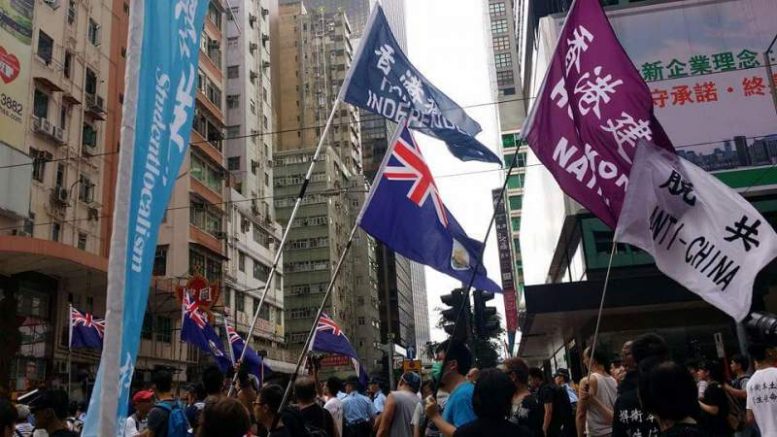By Chris Yeung –
Likened it to narcotics, the Government is waging a war against the spread of the idea of Hong Kong independence in schools. But unlike the crusade against drugs, the battle against pro-independence thinking in campus will prove to be far more controversial and difficult.
Leading the fight against the growth of pro-independence campaign in schools was Chief Executive Leung Chun-ying, who raised the alarm bell in his 2014 Policy Address delivered in January. He singled out articles published in Undergrad, a University of Hong Kong Student Union publication, which promoted the idea of Hong Kong independence.
If he was anxious to dampen the enthusiasm of separatist thinking, his warning has done the opposite. The past two years saw the emergence of the first pro-independence political party, namely Hong Kong Nationalist Party; the first pro-independence candidate close to winning a Legislative Council seat (Edward Leung Tin-kei in the New Territories East by-election) and the first mass rally under the theme of Hong Kong independence last month.
Edward Leung’s rise to political stardom has prompted the central and Hong Kong government to try to bar candidates championing independence from running for Legco seats. Then came the new confirmation form for contestants to declare their acknowledgment of three Basic Law provisions, including one that says Hong Kong is an inalienable part of China.
Officials said it was a move to make sure there will be no pro-independence voices in the legislature.
Speaking to reporters on Tuesday, head of the legal affairs department of the central government’s Liaison Office in Hong Kong, Wang Zhenmin, said it would not be possible for advocates for independence to “enter” the executive, legislative and judicial branches. He said the issue of Hong Kong independence would also not be allowed to “enter” primary and secondary schools to avoid “poisoning” the minds of students.
As Wang spoke, Education Minister Eddie Ng Hak-kim and his aides held meetings with school headmasters, education sponsoring bodies and parents’ groups to ask them to convey a message to students the advocacy of independence was against the Basic Law.
Teachers ‘promoting’ independence risk losing job
Officials earlier warned teachers who “promoted” independence thinking might be disqualified from teaching.
Last week, Chief Executive Leung Chun-ying made a rare appearance at a meeting between Ng and heads of eight government-funded universities reiterating their opposition against independence. Leung reportedly called on universities to act flexibly against independence advocacy and give counselling services to students who supported independence.
With the momentum of pro-independence campaign growing, the Government launched an anti-independence war in schools in the wake of a campaign spearheaded by a new group, Studentlocalism, to call on secondary school students to form groups in their own schools to discuss independence issues.
The new group has warned of fiercer fight-backs if the government acted tough to suppress discussion on the issue of independence in schools.
A brewing row over discussion relating to independence at campuses in universities, secondary and primary schools looks inevitable.
Tension and frictions between schools and students who are keen to discuss the highly-sensitive issue in campuses are bound to occur. Contrary to the authorities’ intention of keeping campus quiet and peaceful, schools will become the battlefield of various stake-holders who hold divergent views on how to handle the issue of independence.
Weighing into the debate, former chief secretary Henry Tang Ying-yen has dismissed the issue of independence as “pseudo-issue” and any discussion a “waste of time.”
The irony, however, is that both mainland and Hong Kong officials have upgraded their rhetoric and actions against what Tang has dismissed as a “pseudo-issue.” And in doing so, they seem to have turned it into a real issue. Worse, they failed to understand the rise of such thinking is not the cause of the problem, but the result of the failures of the “one country, two systems” policy.
Like the two governments’ anti-independence initiatives in the past two years, the latest one targeted at schools are likely to be proved counter-productive by adding more fuel to the fire
Chris Yeung is founder and editor of the Voice of Hong Kong website. He is a veteran journalist formerly worked with the South China Morning Post and the Hong Kong Economic Journal. He writes on Greater China issues.
Photo: Picture taken from Studentlocalism Facebook


Be the first to comment on "War against independence talk in schools counter-productive"